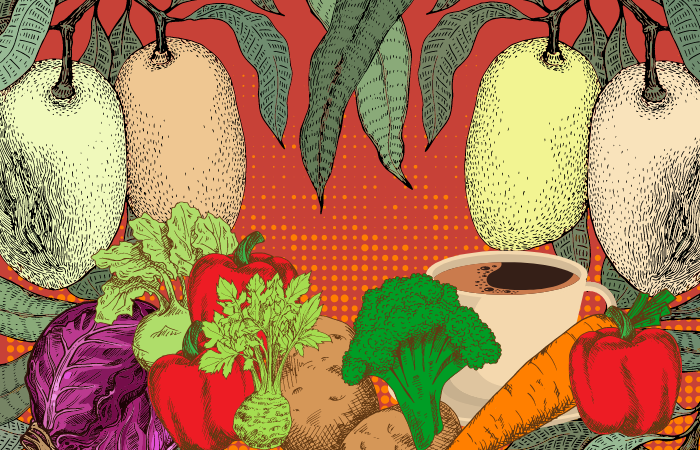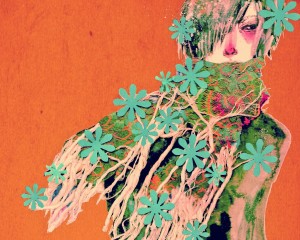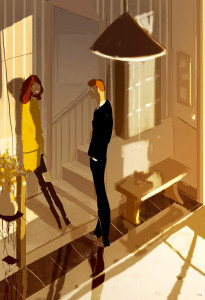Maya puts away our coffee-cups – I’ll rinse them after our walk, along with the produce for lunch – and stands behind me, massaging my neck at the right spot. How did she know? I must’ve been stretching my neck again, without realising it, keeping my eyes on my laptop-screen, across the table from her. Now in the screen I see her behind me, studying my Illustrator workspace: I’m making a lion’s face out of fruit: it’s a pro bono assignment for a fundraiser to protect Indian wildlife during Covid. Maya tilts her head, perhaps wondering if this is also one of those double-image illusions I was working on last month. Tilt-headed, she looks like a listening dog.
Laughing, I reach back over my head to embrace my wife. It’s an awkward hug but a good stretch. She seizes the opportunity to save my work and lid my laptop.
Masked and gloved, cloth shopping bags in pockets, we walk out of our flat and past the lift. We’ve avoided the lift: a confined public space with buttons to touch. I follow Maya down the stairs from our 11th-storey flat. We share a bed, but outside our flat we keep six feet apart: sternly setting a good example. For the second wave of the pandemic is devastating India: but life has always been cheap here, and people have wearied of precautions.
Fifty meters outside our gate lies Hullimavu Lake’s western corner. The mango trees that gave the lake its name edge its southern end, fronting a lower-middle-class neighbourhood. On our side, the lake stretches a kilometer alongside the smooth blacktop: a promenade, insulating us from the grit of the commercial streets further east.
“Have you thought any more about having children?” I say.
We’re both wearing wraparound sunglasses, protecting our mucous membranes; respirator-masks, covering us cheekbone to chin; and a face-screen for good measure. Maya nods. “I have. But I can’t decide.” I follow her gaze towards the lake.
When we moved to the suburbs four years ago, Hullimavu lake was full, visited by migratory ibises and painted storks; and hosting swans, ducks, and cormorants year-round. Now, ringed by high-rise condos, all drawing on the water-table – for the municipal water-supply, depending on a river whose territorial rights three contiguous states have been disputing, is iffy – the lake has shrunk to a remote patch of silver. Fed by sewage from homes and a slew of tiny factories, luxuriant water-hyacinth covers most of the remaining water; the lake’s edges, now dry year-round, have become grassland. At 7am, skinny teenagers are ripping the fencing around the lake and guiding their cattle to this virgin grass. For water buffalo milk is the immunity-boosting trend du jour: providing employment to boys and men who’ve lost their jobs in factories and shops over the course of this endless series of partial and complete lockdowns.
Maya nods at the lake. “Would you want to have a child in this world, Arun?”
It’s Maya who’s been tracking the lake’s slow death. The monsoon still revives it every summer: briefly. Now even the tiny subsistence-fishing-boats have disappeared. It’s Maya who’s been staying up late petitioning municipal authorities, organising civic action: starting with her software-engineer colleagues. But it’s Maya who can’t decide whether this is a world in which to have a child.
“We’ve been discussing children awhile,” I reply. “Would I? Yes, I would… Ma used to say, ‘There’s always going to be an excuse.’ I take that to mean that the best time to do the thing I’ve been wanting to do, putting off doing, is now.”
We walk on. Maya studies the lake’s corpse through its violated fencing; I study – six feet away, silhouetted by the slanting light against sections of fencing still intact, still covered with purple-flowered morning glory – Maya.
We’ve got along well these last fifteen months: considering we’ve been shut up in our flat, then allowed to walk inside our flat-complex, then allowed onto the streets and shops for four crowded hours each morning. But Maya has withdrawn into herself: many days, I’m the only person she speaks to. Last year she chafed at what appeared unnecessary restrictions, depriving millions of their livelihoods. As this year’s second wave has assaulted not only our parents’ generation, but our own – Maya has oscillated between shock and grief.
It’s been hard for extroverts and softhearted people. As for me, watching Pa for twenty years taught me that a soft heart alone, minus ability or intention to act, is a cancer in your bones.
“Sometimes I think,” says Maya, “I’ve been more affected by your parents’ deaths than you.”
“That’s true,” I reply, gently. “We did our best, and now they’re gone.” After Ma died of Covid, Pa declared his intention of dying broken-hearted; Maya insisted he move in with us; I relented; we tried to cheer him up; but Pa proved as good as his word – dying, not of a broken heart, but of a cancer diagnosis he’d kept secret for four years. He went out with maximum drama, making it hard to love him, even at the end. So I contented myself with pity: he’d never learned the difference. His favourite pastime was to love (pity) poor people on the television; but outdoors, at traffic-lights, he’d turn away with practised obliviousness from beggars knocking at car-windows, and mutter, ‘The whole system is broken. What good will my donating ten rupees do?’ “We did our best by both, Maya. It’s Ma who taught me to do my best and then move on.”
“Move on to having a child?” Her voice is muffled behind masks and face-screen; but I hear it wavering.
“You wanted to, Maya, just last year.”
“Yes. Before the world turned upside-down.”
“But it hasn’t really. We’re just seeing now the symptoms of a disease that’s already in late stage.” I nod back over my shoulder. “Four years ago, we used to sip coffee on the balcony while troops of macaques groomed or fought in the tamarind trees. We heard jackals in the night. Remember? They’re all gone now. This whole area, including our flat-complex, Maya – that was someone else’s home… We’ve been violating nature for centuries. This pandemic was long overdue.”
“Good to see your rationalising tools are still sharp,” says Maya, laughing. She’s learned to modulate her voice behind her mask – or, perhaps, I’ve learned to hear the muffled modulations. It’s Maya who got me to quit my lavishly-paid, soul-killing corporate-law job, take a break, and retrain in what I’d originally wanted to do: graphic design. “I miss your parents, Arun, irritating as they were. I miss the world as it was, imperfect as it was.”
“I miss them too… But, as far as the question at hand: practically speaking, the risk to infants from Covid is low. All this hasn’t altered the decision-making of our having a child.” I nod right at the lake, then left at the new highrises across the road: some finished and tenanted; others abandoned, half-finished, when the lockdown sent daily-wage construction-workers home indefinitely. These buildings’ skeletons loom, gray-brown, over clearcut sand-brown wastes: which used to be scrub forests and plantations we explored at the weekends. “Maya, this was already a shitty world in which to have a child. In my view – no, the pandemic hasn’t fundamentally altered that.” Those plantations were eucalyptus: fast-growing, thirsty, commercial monocultures. They’re been replaced by highrise, thirsty buildings. The landscape looks worse now: but I can’t say how much worse it is for the environment. Four years ago, greener, it was already far from pristine.
We’ve reached the end of the lakeside promenade. We turn into the neighbourhood’s main commercial street. The promenade’s smooth median-divided blacktop turns into a dusty gray street: dug up a dozen times to extend electrical cables and waterpipes, then cobbled over half-heartedly, the cobbling disassembled by traffic into a steeplechase of pebbles and sand.
“I know it’s not exactly relevant to us, privileged as we are: but I have a hard time ignoring all this,” says Maya. “It’s Wednesday morning, 9am. Shops are now allowed to open 6am to 10am. We should be seeing rush hour. And look.”
The streets, formerly crowded with speeding commuters and schoolbuses, and maidservants and housewives dodging rush-hour traffic to do morning shopping, are deserted. Nearly every shop is shuttered. Supply-chains have been disrupted; besides, it isn’t profitable to operate only four hours a day: so numerous small businesses have suspended their staffs indefinitely. Only the meatshops, and alcohol-shops – and the odd grocer’s and greengrocer’s – are open.
Grown men, hugging armfuls of particoloured plastic pinwheels, and rainbow-coloured cotton-candy-looking nylon feather-dusters, hasten uphill towards Bannerghatta Main Road. They’re going to hustle, at traffic-lights, what few cars are about: to do the job their five-year-olds would’ve done, back when they themselves had adult jobs.
Down the steep slope, towards us, tanned face sweat-shiny, a grizzled vendor escorts his rickety open cart piled with yesterday’s withered vegetables: his body leaning back, his chicken legs and stick arms straining to keep the cart from racing downhill. He’s headed past the half-finished highrises towards our residential neighbourhood.
“Covid began fifteen months ago,” says Maya, “And Bangalore’s still a ghost town. This will never end. God knows where the people are, god know how they’re living. I want more than anything else to have a child. But I just don’t know if it’s right.”
Maya sees the empty streets, the smog-free air, the deserted construction-sites which parthenium and oleander are reclaiming – and she sees only what stands behind them: a nationful of humans locked in, downsized, fired, starving, alcoholic, suffering. I see the empty streets – and I enjoy our leisurely walks: no need now to look over your shoulder worrying about a speeding SUV, carrying your neighbour across town to work, racing other cars, zigzagging around potholes, bumping your elbow. I see the smog-free air – and I feel glad that the earth has got this respite.
Maya was born into privilege. I’ve had to earn mine. I’ve learned to find my blessings where I can.
“You’re right on both counts, Maya: this is terrible; but people like us always manage. Nobody from your firm or mine has lost their jobs.” Most of my work was already online, including meetings with American clients. Maya was already telecommuting twice a week before last year’s first lockdown. “We can work from home, get everything delivered home, for the rest of our lives. Our children can study, play, grow up at home. We have always been insulated from all this.” I survey the vanishing lake, the clearcut forests, the desolate streets. “To us, all this is just scenery.” She turns sharply to me. “I don’t say this with pride. I say this as a fact to consider in our decision-making.”
We walk in silence, up the steep hill, struggling to breathe through our respirators and face-shields.
Maya not only grew up more affluent than me, she is in most respects out of my league. (For instance, she’s the kind of person who sincerely doesn’t know what a ‘league’ is.) The one thing I’ve always been able to do is calm her. Now, with the world falling apart, I can’t even do that. Maya’s always leaned neurotic; now, she often agonises over trivial decisions. We were discussing children before the pandemic; so, grasping at straws, I revived the idea.
Now I decide to drop it. It’s only making her more anxious. She’s been suggesting a trip when lockdown lifts. I’ve hesitated: for lockdown might lift, only to be reimposed; then getting home might be hard. But now I’ll say yes: airlines have done a decent job getting stranded citizens home; at worst, we’ll be stuck abroad: we can afford it. We’ll visit Indonesia: she’s wanted to go for years; I’ll read up the history so I can enjoy the sights.
Yes: let’s drop having children for now. Maya needs a break; she doesn’t need another decision to agonise over.
“We could donate to charity,” Maya muses. “We’ve only been donating 10% of our income.” This was my idea: but inspired by Maya. Maya doesn’t just have a soft heart: she crosses the road to buy biscuits, then crosses back to place them beside the beggar dozing curled up on the footpath. “Children are so expensive, Arun. If we don’t have children, we can give everything away. I lie awake at night thinking about the misery inside those shacks.” We’re now passing the little boxes, hacked together from sheets of corrugated tin, roofed with sulphur-blue tarpaulin – that flank the street and pass for human dwellings. “Now they’ve lost their jobs – whatever they were. They’re bundled in there, night and day.” This street is festooned with open-air rubbish-dumps: deposited by residents who’re unserviced (as about a third of the endlessly-expanding city’s residents are) by municipal rubbish-trucks. The rubbish-dumps draw street dogs: bringing the slum-dwellers company.
I’m not being ironical. Wealthy folk feed a street dog occasionally, on a whim, for selfies. Poor people, unused to worrying about tomorrow, unskilled in separating themselves from their environment, feed their neighbourhood wildlife whenever they get a meal themselves.
“I can’t sleep at night, thinking about all this,” Maya continues. “Should we have children? I just can’t decide. Mum says I should just have a baby and then everything will be clear. She says, ‘That’s how most babies come about, and they do fine, don’t they?’ She’s as naïve as a child herself, but I envy her sometimes… I want to make the right decision. But how can you decide anything, when everything’s up in – Oh! Sorry.”
It’s Maya who apologises – to four or five children who’ve run into the street and almost into her.
We turn to see where they’ve come from: a pebble-and-sand footpath leading to the abandoned construction-sites. Formerly – when we walked at dawn before commuting to work – we’ve glimpsed the procession of open-air defecators to and fro the slum. Lacking access to a toilet, the families carry water, in old plastic paint-cans, to wash their bums after a shit far from home in the open fields. We smell the shit now, downwind of an easterly breeze, faint enough to smell merely spicy. The world has changed, but not this. Through all my plasticky facial paraphernalia, I sniff, almost gratefully, this familiar smell.
We turn to watch the children. Barefooted, wearing red gauze frocks and Spongebob teeshirts cast off after one or two wears by the children of people like us. One vagabond wears, fashionably oversized, the uniform of the upper-class school to which some of our neighbours send their children. But these children, skipping uphill, haven’t had to get used to remote learning.
Laughing and teasing, they dance across the desolate rubbish-strewn street. They reach the top of the hill, towards which we’ve been climbing. The red-frocked girl, the tallest of the ragamuffins, points and cries in Kannada, “Race to the lake and back! One two three go!”
They take off. I stand clear. Maya turns to watch them run downhill, towards the emptied lake, towards the toiling old vegetable-vendor. They seem to be falling downhill and, heart in mouth, I wonder whether they’ll run into the poor old man. I open my mouth to shout; at the last instant, they veer away from him, their shouts of reasonless joy rending the funereal summer morning. The old man reaches the bottom and turns his cart smartly into the lakeside promenade. I decide we’ll buy today’s produce from him on our way home. It’s a bit wilted: but we’ll compensate with butter and herbs. The children touch the lake’s fencing to show they’ve run to the end, and cross the promenade again to dash back uphill towards us.
Maya laughs, and – forgetting social distancing – clutches me, briefly giddy with joy. “Thank god for children!” she says.
I can see hardly anything of her face: still I can make out the look that used to say, ‘If we weren’t outdoors, and if this weren’t India…’
We recover ourselves. Keeping six feet apart, still setting a good example to the desolate streets, we walk down the other side of the hill.
END





